“Modern people…find themselves searching for new value commitment, for new religious synthesis and ultimately for a new identity.”
(p. 11, Harvard University –IBM Report, 1972)
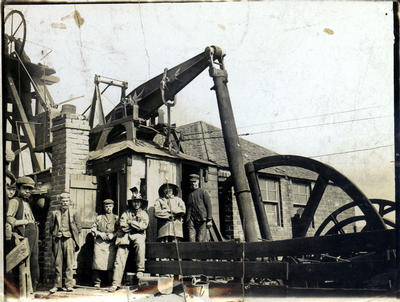
Mechanical Metaphors about
social change
"Mechanization takes command." S. Gideon
|
Determinists |
Adaptationists |
|
Does technology determine
social conditions? |
Or does society chose
techniques to master new technology? |
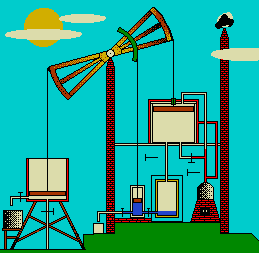
Newcomen engine from the early 18th century.
Meaning
Machine,
machinery: “a system of usually rigid bodies, formed & connected to
alter, transmit, and direct applied forces in a predetermined manner to
accomplish a specific objective such as the demonstration of useful
work.”
those devices having
a source of motive power to do work.
“limits to development resulting from reliance on land based
resources were slowly removed.”
(Pacey, 109)
Thoreau: “We do not ride upon the railroad, it rides upon us.”
(Marx, 249)
Thomas Carlyle: ‘ the mind will become subject to
the laws of matter; that physical science will be built up on the ruins of our
spiritual nature; that in our rage for machinery, we will ourselves become
machines.”
(Marx, 183)
“science
will be master of man. The engines he will have invented will be beyond his
strength to control.”
(Adams, in Marx, 350).
“Development
is primarily a matter of adapting and extending an invention so that it can be
integrated into both a technological system and a business and cultural
system.”
(Hindle, 74)
“the image
of the machine connotes a loss of inner freedom even as it provides outward
power.… free in hand and foot. we are shackled in heart and
soul…” (Marx 173)
The “cutting of an umbilical chord”
(Marx 346)
“the original unity … the all sufficing beauty &
abundance of the creation.”

Ways out of
the mechanized maze of delusion
“Every
technological advance has come at a price -- but the full price is seldom known
until long after the achievement… The technology of industrialization has
moved us into an increasingly complex world…. Humankind has reached a
point where it must work consistently to exercise its new power over technology
and social organization.”
(Hindle, p. 279)
“The
complement to prudent technology is the ecological approach to science.”
“It is the
ecological wisdom of cooperating with
nature rather than trying to master her.”
(Goodman in Technology, pp. 247-248)
“the
laboring man has not the leisure for a true integrity… he cannot afford
to sustain the manliest relations to men;
he has no time to be anything but a machine.”
(Thoreau in Leo Marx, p. 248)
“Even if
this were dismissed as a long-term view there is the immediate question of
whether ‘ modernization,’ as currently practiced without regard to
religious and spiritual values, is actually producing agreeable results.”
“For it is not a question of choosing between ‘modern growth’ and ‘traditional stagnation.’ It is a question of finding the right path of development, the ‘Middle Way’ between materialist heedlessness and traditionalist immobility, in short, of finding ‘Right Livelihood’.”
(Schumacher in
Tichi, p. 238)
These
authorities ask: Who or what are in charge here?
“You may think all is nonsense, but I tell you these are great times. Man has mounted science and is now run away with. I firmly believe that before many centuries more, science will be master of man. The engines he will have invented will be beyond his strength to control. Some day science may have the existence of mankind in its power, and the human race commit suicide by blowing up the world.”
[letter between two brothers; Charles and Brookes Adams,
exchanged in 1862.]
“Science has long been chief orthodoxy of modern times and has certainly been badly corrupted.”
(Marx,
p. 254).
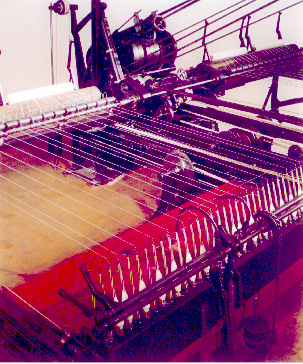
Automated weaving machinery.
“Ours is an intricately organized, urban, industrial,
nuclear armed society.”
“rural myth & the technological fact.” (354)
“the spontaneous fruit of the edenic tree” (7)
“he is unaware of the artificial, almost incredible,
character of civilization.”
“the scenery of America is peculiarly hospitable to pastoral
illusions.” (352)
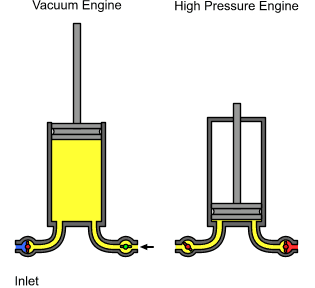
The engine emerged in the late
19th Century
“The engine was being
presented as the most telling ‘sign’ of modern life.”
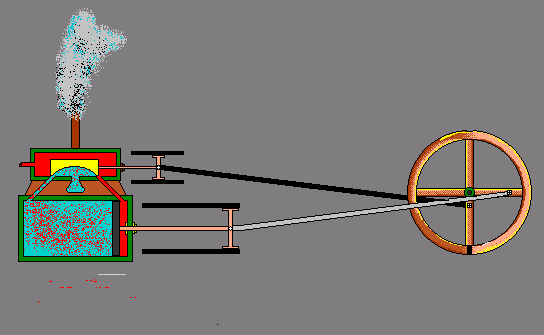
“It was” a new kind
of “controlling symbol for a new kind of culture.”
Pacey, p. 167, quotes Leo Marx,
(1964), p. 170.
Sources:
Harvard University Program on Technology
and Society: A Final Review, (1972)
Leo Marx, The
Machine in the Garden, (1964)
Cecilia Tichi, Shifting Gears, (1987)
Arnold Pacey, Technology in World Civilization, (1990)
 |
||
|---|---|---|
| Tools of Toil: what to read. | ||
| Tools are historical building blocks of technology. | ||

